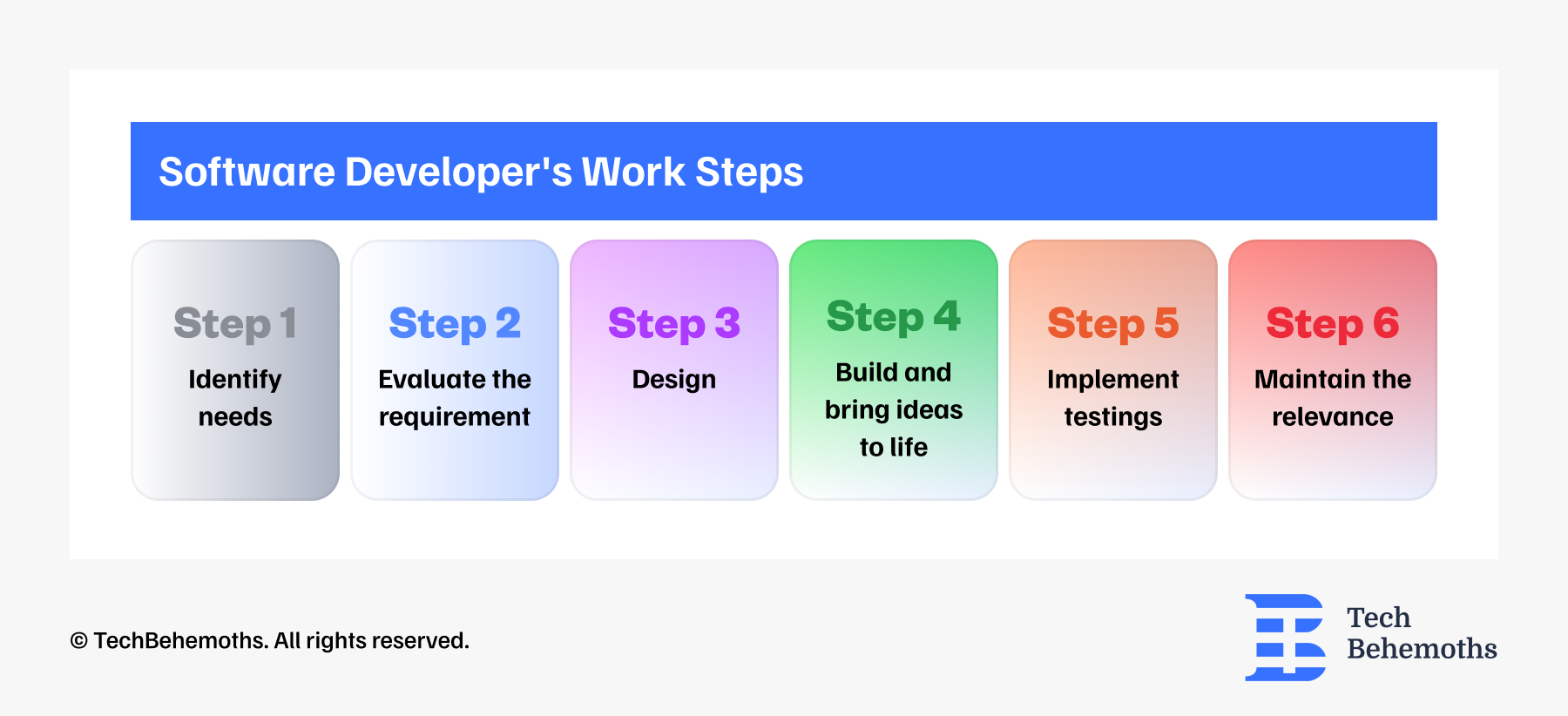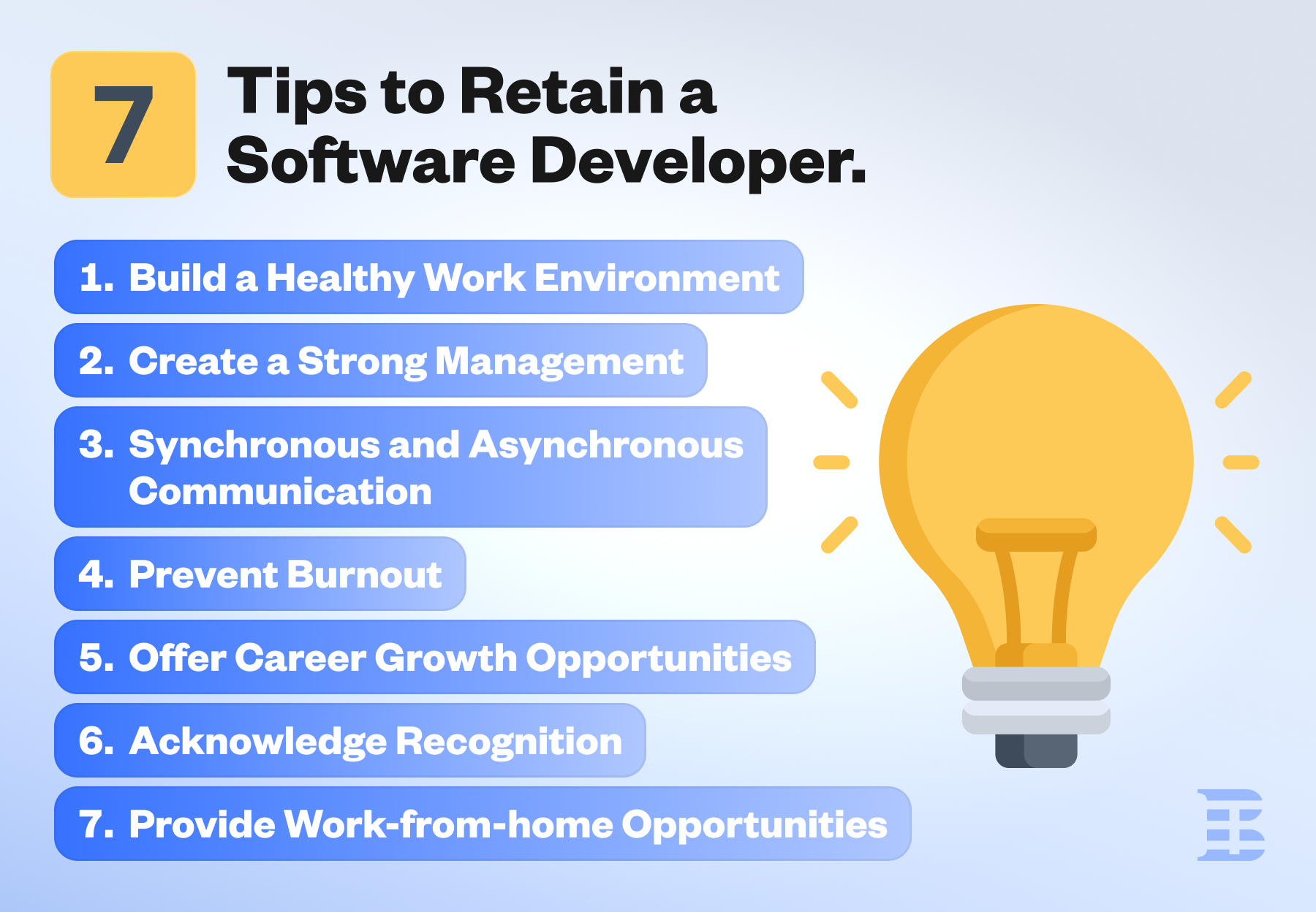How to Retain Great Software Developers

Summary
- The Software Development market is expected to reach $742.58 billion by 2025, with an annual growth rate of 2.88% from 2025 to 2030.
- Software Developers are crucial for a company since they transform clients’ requests into reality.
- Annually, tech companies are losing about 13.2-18.3% of top IT talent, equivalent to one out of every six or seven of the firm’s Developers.
- Software Developers are particularly affected by burnout, with more than 80% of them reporting that they have experienced or are suffering from it.
- A 2024 report found that about 23% of Developers were working overtime at least 10 days per month.
The demand for Software Developers is growing continuously, with the Software Development market predicted to reach $742.58 billion by 2025, at a 2.88% growth rate for 2025-2030. The need for these professionals stems from increased cloud use, IoT development, and broader applications of blockchain beyond crypto.
Besides the tech industry, Software Developers are highly valued in domains such as finance, healthcare, manufacturing, and automotive. Considering the high demand for Software Developers, this article focuses on why Software Developers are indispensable for companies, reasons why they look for another place, and tips to retain them.
What is a Software Developer?
A Software professional is the person who works on turning your idea into a real Software product. The applications that they develop facilitate business operations, engagement, and daily life. To do this, Software Developers usually follow several steps:

Turning concepts into functional solutions is just one task that Software Developers accomplish. Besides this, they offer many perks to an organisation or a project, underlining their influence on the team.
What Are the Benefits of a Software Developer for Your Company?
Software professionals are crucial due to their tech innovations, problem-solving skills, and the potential to position the firm as a strong rival in the market.
Tech advancements across sectors
- Finance (safe Software apps for transactions, automating services, and ensuring compliance with regulations).
- Manufacturing (automation and AI for production processes optimization).
- Education (e-learning platforms for accessible learning experiences).
- Healthcare (data analysis for increased quality and efficiency).
Innovation and Problem Solving
- Creation of custom products
- Gain of a competitive advantage
- Transition to cloud-based services
- Enhance flexibility and scalability
- Help firms make informed decisions with data processing
Staying Ahead in a Competitive Market
- Help companies to stay relevant with continuous advancements and knowledge of the latest programming languages.
- Encourage businesses to create Software that optimizes their task flow
- Increase sustainability
- Enable customers and firms to perform assignments leveraging tech more easily and efficiently.
The need for these tech professionals is undeniable, as it is shown by the rising demand across multiple industries. This is why companies must acknowledge tips for increasing the rate of retention among Software Developers, which include the following suggestions.
7 Tips to Retain Software Developers
Annually, tech companies lose about 13.2-18.3% of top IT talent, equivalent to one out of every six or seven of the firm’s Developers. Additionally, replacing a single Developer costs around 30-70% of their salary per year. For your team to maintain the Software Developers, you need to create a strategy considering the following recommendations.

Build a Healthy Work Environment
A healthy work culture means creating social connections that enhance trust, employee engagement, and help professionals feel seen and valued. Since most Software Developers work remotely, their organization should adapt its environment to support this work model. Nearly 43% of Developers reported remaining at a company because their work-life balance is respected, according to Statista.
To do that, organisations can make the work days more personal, initiating casual conversations and asking employees about their day. Starting conversations in the team's meetings enhances real interactions among colleagues. Companies can improve their Developer teams by encouraging them to start casual conversations to exchange personal information and engage in offline hangouts. Strategies like these can also drive retention among Software Developers.
Create a Strong Management
A manager’s job isn’t only to accomplish and assign tasks, but it is also to ensure a productive team through a good environment discussed earlier. A study of almost 150 Software professionals found that management is one of the main factors that affects job satisfaction. For this purpose, investments should be made in the organisation’s management teams through training and learning programs.
Additionally, managers need to notice hints that can endanger the team’s well-being, for example, anxiety at the meetings or an employee’s emotional strain, to avoid or solve the rising challenges. Managers who offer directions, make regular check-ins, and encourage feedback are bonding with the firm’s employees, creating trust and loyalty.
Balance Synchronous and Asynchronous Communication
Asynchronous communication is a method of sharing information where participants do not need to be present or to respond at the same time. This method can weaken employees' connections and create a cold environment. In virtual calls and checkups, it is very hard to acknowledge the colleague’s tone of voice and other important body language for understanding the message.
To avoid this issue, firms can combine asynchronous and real-time meetings. Tools like Slack, Google Meet, and Zoom are useful for regular checkups, virtual calls, and document administration. But for team bonding, the best option is in-person and off-work hangouts, which is why it is best to leverage both strategies.
Prevent Burnout
Burnout is a phenomenon that affects an individual’s level of energy, motivation, and engagement. While it is common in every job, Software Developers are particularly affected by it, with 83% of them reporting that they suffered or are suffering from workplace fatigue. They are more prone to it due to the isolation they experience from remote model, repetitive work tasks, high expectations, tight deadlines, and significant responsibilities.
Companies should ensure internal communication systems that allow Software Developers to share updates and feedback to avoid professional exhaustion. Managers should make continuous checkups with their teams. Using transparent systems is helpful to see what deadlines and Developers’ tasks are to understand their workload, and help them avoid increased stress. Other methods include increasing burnout awareness, facilitating time off, and encouraging professional boundaries.
Offer Career Growth Opportunities
According to Statista, about 40% of Developers considered changing their jobs in 2024, due to not having progression possibilities as one of the main issues. Not having the possibility to advance in a professional way, Software Developers can experience apathy, low productivity, and ultimately lead to them leaving the team.
Contrary, firms that offer growth possibilities will be more likely to keep their professionals. To make this possible, employees should receive upskilling training options to help them feel more confident. Software Developers can understand that their company cares for them through its investment in their future and personal growth.
Additionally, employees need to have a clear career path towards advancement, because they will work harder and have more reasons to stay in the organisation.
Acknowledge Recognition
A culture of validation in the workplace contributes to 56% fewer employees looking for new jobs. Additionally, this improves employee well-being, with 73% professionals less likely to experience stress. Firms that follow the recognition strategy have motivated, loyal, and engaged Software Developers.
Recognition method can include the following steps and initiatives. Making appreciation visible and accessible, for example, give praise close to the event and not at the end of the month or year. Channels that are used by the team can be useful to share this acknowledgment in the workflow. Lastly, making sure that remote colleagues also get the same level of acknowledgment is also very important.
Provide Work-from-home Opportunities
Software Developers are expected to have 143,400 remote roles for 2023-2031, being at the top of the list with the most common remote tech jobs. Perks for remote Software Developers include a better work-life balance, flexibility, and reduced stress, important for good productivity. Saving money and time from not needing to commute to the office is another reason why Software Developers choose a remote model.
Understanding these benefits is essential for companies that want to increase their retention rates. A proof of this concept is the statistics that 50% of all employees would accept a 5% reduction in pay for a remote post. That’s why firms should offer, aside from in-office jobs, there should be also remote or hybrid roles.
Because Software Developers are commonly remote employees, the method to increase their retention rate should be adapted for a remote and in-office model.
Every tech firm can create its own strategy with customized tips to maintain its Software Developers based on their individual needs for a higher chance of retaining them in the company.
| Tips | Strategy for Implementation |
|---|---|
| Develop a healthy work environment | Make work days more personal and create possibilities for casual hangouts |
| Create strong management | Investment in the management team |
| Combine synchronous and asynchronous communication | Combine asynchronous and real-time meetings with the use of tools like Slack, Docks, and Zoom |
| Avoid burnout | Increase emotional strain awareness while facilitating time off and encouraging professional boundaries |
| Offer professional development opportunities | Offer upskilling training options and directions for career advancements |
| Acknowledge recognition | Make appreciation visible and accessible |
| Provide remote opportunities | Understand the benefits of remote work for Software Developers |
Why Are Software Developers Hard to Retain in a Firm?
It is a key factor to understand the reasons Software Developers leave as much as understanding how to make them stay. These aspects center around limitations in flexibility, routine tasks, and resource wasting.
Outdated Technology and Tools
A Software Developer role requires the use of cutting-edge technologies and tools. Working with outdated or inefficient systems can cause multiple issues, including decreased productivity, poor quality, longer task times, rising frustration, and, lastly, increased turnover.
Strategies for implementation include investing in the modernization of their tech stack, making sure that their Software Developers have access to the latest tools. A firm’s focus on new technologies enhances productivity and shows employees its dedication to making their assignments easier.
Lack of Autonomy and Creative Freedom
Work independence and creative freedom are essential criteria for Developers to make decisions and contribute creatively to projects. Factors like rigid policies and micromanagement can limit innovation and cause Software Developers to look for a more flexible job opportunity.
Allowing their employees to push their limits in tasks highlights the company's trust in them, causing employee loyalty and higher chances of keeping top tech talent. Additionally, adopting a balanced structure with autonomy and flexibility is very helpful in fostering an employee environment where Developers can thrive and use their full potential.
Boredom
Software Developers are more prone to boredom due to their repetitive tasks and lack no new projects. Projects that come and go create another routine that increases their level of boredom. Even the best efforts of the organisation to create a healthy work life can’t 100% prevent Developers to not experiencing it.
To help Software Developers get rid of job boredom, firms can start by understanding three factors that contribute to its appearance. They include low personal appreciation, not being able to visualise the bigger picture, and a sense of slow personal progress. Creating a culture of appreciation for their contributions is a solution that can increase employee retention levels.
Excessive Overtime
A 2024 report states that about 23% of Developers were working at least 10 extra days per month. If a company enables overtime, it creates a sensation of underappreciation among professionals or makes them feel like their team has poor task assignment. Additionally, it can cause tension and conflicts among the team. These factors increase the likelihood of Developers searching for a new company.
For a firm to replace the lost Developer is budget costing, but for an employee, it is a change to look for a better place. A strategy for this issue is to set realistic deadlines, improve project estimation, and balance tasks across the Developer team.
Bugs and Troubleshooting Tasks
More than 57% of Developers are dedicating their time to meetings that focus on resolving application performance issues. These troubleshooting calls usually drive attention and resources from the Developer’s responsibilities and tasks, for example, creating new Software or optimizing the old ones.
Troubleshooting tasks often lead to demotivation, stress, and resource wasting, with more than 80% of employees feeling irritated. Spending more time to fix bugs can make employees feel that the workplace compromises their career advancement possibilities. Steps like implementing strong testing practices, boosting coding standards, and allocating time for troubleshooting can create a structure for bug fixing and avoid resource wasting for Developers.
Factors that influence Software Developers to change their jobs should be acknowledged and solved because it is easier and less costly for them to find a new team than for the organisation to find a new employee.
| Problem | Solution |
|---|---|
| Outdated Technology and Tools | Modernize tech stack and update tools regularly |
| Lack of Autonomy and Creative Freedom | Allow employees to push their limits in work tasks, and balance autonomy with flexibility |
| Boredom | Provide variety and meaningful tasks, and new projects |
| Overtime | Set realistic deadlines and improve estimation |
| Bugs | Enforce coding standards and strengthen testing |
Conclusion
The rising demand for Software Developers is proven by their responsibilities and benefits for their team. Retaining them can be difficult if several factors are present at the same time, including old technology and tools, lack of autonomy and creativity, boredom, overtime, and troubleshooting tasks. They lead to frustrations, decreased productivity, and professional exhaustion that later cause Developers to quit and look for better possibilities.
To avoid this scenario is indispensable to adopt some initiatives, such as creating a healthy work environment, having strong management, combining synchronous and asynchronous communication styles, preventing stress, providing career advancements, accord recognition, and offering remote or hybrid options.
Related Questions & Answers
How Could Flexible Benefits Like Sabbaticals or Wellness Programs Contribute to Retention?
How Do Peer Mentoring or Knowledge-sharing Programs Impact Employee Engagement?
Which New Programming Languages or Frameworks Are Currently Most in Demand for Developers?
How Can Companies Prevent Isolation Among Fully Remote Teams?